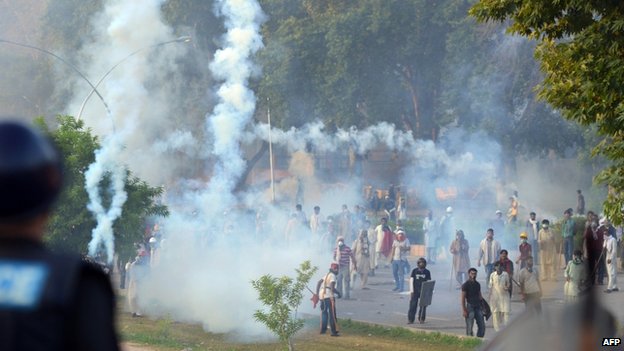Pakistan’s army commanders are to meet amid clashes between police and anti-government protesters which have left three people dead and hundreds hurt.
The meeting was brought forward after clashes flared overnight. Protesters are demanding PM Nawaz Sharif resigns.
Demonstrators loyal to opposition politician Imran Khan and cleric Tahirul Qadri have been taking part in a sit-in for two weeks.
They accuse Mr Sharif of corruption and electoral fraud – charges he denies.
There are now widespread fears that the escalation of political tensions may cause the army to intervene and weaken the country’s fledgling democracy, the BBC’s Ilyas Khan reports from Islamabad.
Police have used tear gas shells and rubber bullets to disperse hundreds of protesters armed with batons, gas masks and slingshots.
The protesters broke security barriers to move closer to Mr Sharif’s residence late on Saturday, sparking clashes with the police which continued overnight and into Sunday.
Islamabad police chief Khalid Khattak told the BBC that close to 100 protesters had been arrested, some armed with “axes, hammers and cutters”.
An official at the Polyclinic hospital in Islamabad told reporters that the wounds of those injured were caused by teargas shells, stones and batons.
One protester died of a heart attack in a ditch near the clashes, said Dr Wasim Khawaja, spokesman for the Pakistan Institute of Medical Sciences hospital in Islamabad.
The man, Naveed Razzaq, was a supporter of cleric Tahirul Qadri, AP reports.
A BBC correspondent who visited the same hospital reports that many of the injured are policemen.
‘Unimaginable attack’
On Friday Pakistan’s powerful army chief, Gen Raheel Sharif, stepped in to mediate amid an ongoing deadlock.
Imran Khan ended talks with the government last week.
A government minister said that repeated attempts to resolve the two-week long standoff with protesters had failed.
Speaking to BBC World TV, cleric Qadri condemned the police’s actions as an “unimaginable attack by the state upon the people”, and denied that protesters were armed with weapons.
Local TV pictures showed police throwing tear gas shells, and protesters throwing rocks back at them, some wielding sticks and slingshots.
Military helicopters were despatched to survey the scene on the Constitution Avenue, one of the most secure zones in the city, housing a number of government buildings and residences.
The violence was sparked when the two opposition leaders ordered their supporters, many whom were wielding batons, to move closer to the PM’s house.
The protesters began their sit-in after a huge march from Lahore to Islamabad, vowing to camp out in the capital until the government stood down.
Last year’s elections marked Pakistan’s first civilian transfer of power.
Source: BBC

